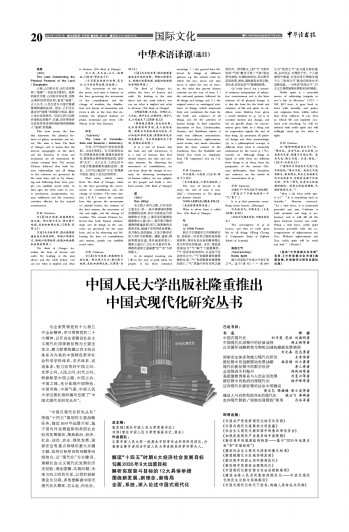地理/dìlǐ/
The Laws Determining the Physical Features of the Land/ Geography
大地、山川的分布、运行及其规则。“地理”一词出自《周易》。地形的起伏交错、山川的分布走势,呈现出某种恒常的法则,就是“地理”。古人认为,人伦生活与天地万物遵循着相通的法则。因此,人们可以通过对“地理”的观察与效法,确立人伦生活的秩序。后世又将与自然环境相应的物产、交通、居住等经济生活及其受自然环境影响的规律纳入“地理”的范畴。
Thisterm means the laws that determine the physical fea⁃tures of plains, mountains and riv⁃ers. The term is from The Book of Changes,and it means that the uneven topography of the land,and the direction of rivers and mountains are all determined by certain constant laws. The ancient Chinese believed that both hu⁃man relationships and all things in the universe are governed by the same laws, and so by observ⁃ing and following these laws, peo⁃ple can establish social order. In later ages, the term came to cov⁃er production, transportation, hu⁃man settlement and the economic activities affected by the natural environment.
引例 Citations:
◎《易》与天地准,故能弥纶天地之道。仰以观于天文,俯以察于地理,是故知幽明之故。(《周易·系辞上》)
(《易》与天地齐等,因此能够普遍包含天地的法则。仰视以观察天文,俯视以观察地理,就能知晓幽隐和显明的事理。)
The Book of Changes de⁃scribes the laws of heaven and earth. By looking at the stars above and the earth below, one can see what is implied and whatis obvious. (The Book of Changes)
◎三光,天文也;山川,地理也。(《汉书·郊祀志下》)
(日月星辰的运行法则,是天文;山川的分布走势,是地理。)
The movement of the sun,the moon, and stars is tianwen,or the laws governing the movement of the constellations and the change of weather; the distribu⁃tion and layout of mountains and rivers is dili,or the laws that de⁃termine the physical features of plains, mountains and rivers. (The History ofthe Han Dynasty)
天文
/tiānwén/
The Laws of Constella-tions and Seasons / Astronomy
天体、天气的运行变化及其规则。出自《周易》。日月星辰的运行、四季昼夜的交替、寒暑风雨的变化,都呈现出某种恒常的法则,这即是“天文”。古人认为,人伦生活与天地万物遵循着相通的法则。因此,人们可以通过对“天文”的观察与效法,确立人伦生活的秩序。
This term, which comes from The Book of Changes,refers to the laws governing the move⁃ments of constellations and the change of weather. The term tian⁃wen (天文) means the constant laws that govern the movements of celestial bodies, the rotation of the four seasons, the succession of day and night, and the change of weather. The ancient Chinese be⁃lieved that both human relation⁃ships and all things in the uni⁃verse are governed by the same laws, and so by observing and fol⁃lowing the laws of constellations and seasons, people can establish social order.
引例 Citations:
◎《易》与天地准,故能弥纶天地之道。仰以观于天文,俯以察于地理,是故知幽明之故。(《周易·系辞上》)
(《易》与天地齐等,因此能够普遍包含天地的法则。仰视以观察天文,俯视以观察地理,就能知晓幽隐和显明的事理。)
The Book of Changes de⁃scribes the laws of heaven and earth. By looking at the stars above and the earth below, one can see what is implied and what is obvious. (The Book of Changes)
◎刚柔交错,天文也。文明以止,人文也。观乎天文,以察时变;观乎人文,以化成天下。(《周易·彖上》)
(刚柔相互错杂,是天的法则。礼仪昌明有所节制,是人伦的法则。观察日月星辰的运行状态,可以知道四季的变换;考察诗书礼乐的发展状况,可以用来教化天下百姓、实现文治昌明。)
It is a law of heaven that the hard and soft interweave; it is a rule of humans that they should observe the rites and con⁃duct restraint. By observing the movement of constellations, we can learn about the change of sea⁃sons; by observing development of human culture,we can enlight⁃en the people and build a civi⁃lized society. (The Book of Changes)
道
/dào/
Dao (Way)
本义指人所行之路,引申而有三重含义:其一,指不同领域的事物所遵循的法则,如日月星辰运行的规律称为天道,人事活动所遵循的规律称为人道;其二,指万事万物所遵循的普遍法则;其三,指事物的本原或本体,超越于有形的具体事物,是万物生成的基始,又是万物存在和人类行为的根据。儒家、道家、佛教等都谈论道,其内涵差异甚大。儒家之道以仁义礼乐为基本内容,佛教和道家之道偏重“空”“无”方面的意义。
Inits original meaning, dao(道)is the way or path taken by people. It has three extendedmeanings:1) the general laws fol⁃lowed by things in different spheres, e.g. the natural order by which the sun, moon and stars move is called the way of heav⁃en; the rules that govern human activities are the way of man;2)the universal patterns followed by all things and beings; and3) the original source or ontological exis⁃tence of things, which transcends form and constitutes the basis for the birth and existence of all things, and for the activities of human beings. In their respective discussions of Dao, Confucianism,Daoism, and Buddhism imbue it with very different connotations.While benevolence, righteousness,social norms, and music education form the basic content of the Confucian Dao, the Buddhist and Daoist Dao tends to emphasize kong (空 emptiness) and wu (无void).
引例 Citations:
◎天道远,人道迩。(《左传·昭公十八年》)
(天之道遥远,人事之道切近。)The way of heaven is far away; the way of man is near.(Zuo’s Commentary on The Spring and Autumn Annals)
◎形而上者谓之道。(《周易·系辞上》)(未成形质者称为道。)
What is above form is called Dao.(The Book of Changes)
气
/qì/
Qi (Vital Force)
独立于主观意识之外的物质实体,是构成一切有形之物的原始物质材料,同时也是生命和精神得以发生和存在的基础。此外,某些思想家还为“气”赋予了道德属性。“气”没有具体的形状,永远处于运动变化之中。“气”的凝聚意味着事物的生成,“气”的消散意味着事物的消亡。“气”贯通于所有有形之物的内外。哲学意义上的“气”与常识性的“气体”概念不同,“气体”指各种非液体、非固体的存在;而从哲学层面来看,液体、固体既是有形之物,其生成、存在也是“气”凝聚的结果。
Qi(vital force) has a materi⁃al existence independent of subjec⁃tive consciousness and is the basic element of all physical beings. It is also the basis for the birth and existence of life and spirit. In ad⁃dition, some thinkers have given a moral attribute to qi. Qi is in constant motion and change, and has no specific shape. Its concen⁃tration gives birth to a thing and its evaporation signals the end of that thing. Qi permeates all physi⁃cal beings and their surroundings.Qi,as a philosophical concept, is different from what is commonly understood by the word qi (气),namely,air. Although things in liquid or solid form are different from things in air form, from the perspective of the ancient Chi⁃nese philosophy, their formation and existence are the results of the concentration of qi.
引例 Citations:
◎通天下一气耳。(《庄子·知北游》)(贯通天下万物的就是一个“气”罢了。)
It is qi that permeates every⁃thing under heaven. (Zhuangzi)
◎天地合气,万物自生。(王充《论衡·自然》)
(天地之气相互交合,万物自然而生。)
The convergence of qi of heaven and that of earth gives life to all things. (Wang Chong:A Comparative Study of Different Schools of Learning)
浩然之气
/hàoránzhīqì/Noble Spirit
盛大而充盈于生命之中的正直之气。孟子(前372? — 前289)认为“浩然之气”是与道义相匹配的,由内而生,非得自于外。个人能够坚守善道,反省自身行事能无愧于心,“浩然之气”就会自然发生并逐渐充盈。一旦养成“浩然之气”,行正义之事便能果决勇敢而无所疑虑。
Noblespirit is a powerful source of cultivating integrity in one’s life. In Mencius’(372? -289 BC)view, it goes hand in hand with morality and justice and originates from within rather than from without. If one lives an ethical life and regularly con⁃ducts soul searching, he will be imbued with noble spirit and will willingly stand up for what is right.
引例 Citation:
◎“敢问何谓浩然之气?”曰:“难言也。其为气也,至大至刚,以直养而无害,则塞于天地之间。其为气也,配义与道。无是,馁也。”(《孟子·公孙丑上》)
(“请问什么叫浩然之气呢?”孟子回答说:“难以言说。浩然之气极其强大、极其刚正,用正义去培养它而不去伤害它,它就会充满于天地之间。作为一种气,它是与义和道相匹配的。没有义和道的相配,气就会疲弱无力。”)
“May I ask what noble spir⁃it is?”“It is something hard to describe,” Mencius answered.“As a vital force, it is immensely powerful and just. Cultivate it with rectitude and keep it un⁃harmed, and it will fill all the space between heaven and earth.Being a vital force, noble spirit becomes powerful with the ac⁃companiment of righteousness and Dao. Without righteousness and Dao, noble spirit will be weak and frail.”(Mencius)
(选自“中华思想文化术语”系列,《中华思想文化术语》编委会编,外语教学与研究出版社出版)



 上一版
上一版

 缩小
缩小 全文复制
全文复制